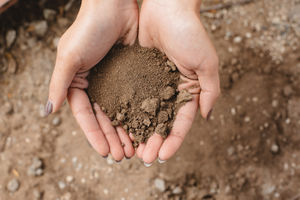Difference between revisions of "Silt"
| Line 4: | Line 4: | ||
Silt is a granular sediment that can be transported and deposited by water, ice, and wind. Silt particles are larger than clay, but smaller than sand. To be classified as silt, a particle must be between .002 to .05 mm [1]. Similarly to [[clay]], sand, and gravel, silt is found in [[soil]]. Silt can also occur as sediment mixed in suspension with water. Because of silt’s spherical shape, it retains a large amount of water. Silty soil is known to be more fertile than other soils, and many species of [[organisms]] thrive in it. | Silt is a granular sediment that can be transported and deposited by water, ice, and wind. Silt particles are larger than clay, but smaller than sand. To be classified as silt, a particle must be between .002 to .05 mm [1]. Similarly to [[clay]], sand, and gravel, silt is found in [[soil]]. Silt can also occur as sediment mixed in suspension with water. Because of silt’s spherical shape, it retains a large amount of water. Silty soil is known to be more fertile than other soils, and many species of [[organisms]] thrive in it. | ||
| − | |||
| − | |||
| − | |||
==Formation== | ==Formation== | ||
| + | ==Classification== | ||
==See also== | ==See also== | ||
Revision as of 00:23, 9 May 2018
Definition
Silt is a granular sediment that can be transported and deposited by water, ice, and wind. Silt particles are larger than clay, but smaller than sand. To be classified as silt, a particle must be between .002 to .05 mm [1]. Similarly to clay, sand, and gravel, silt is found in soil. Silt can also occur as sediment mixed in suspension with water. Because of silt’s spherical shape, it retains a large amount of water. Silty soil is known to be more fertile than other soils, and many species of organisms thrive in it.
Formation
Classification
See also
- Clay
- Loam
- Founders of Soil Concepts
- Humus
- Microorganisms
- Pedogenesis
- Soil
- Soil Textures
- Soil Properties
- Jenny Equation
References
[1] National Geographic Society. “Silt.” National Geographic Society, 9 Oct. 2012, www.nationalgeographic.org/encyclopedia/silt/.
[2]
[3]
[4]
[5]
[6]
“Silt: Environmental Impact.” Rashid's Blog: An Educational Portal, 8 May 2016, rashidfaridi.com/2016/03/04/silt-environmental-impact/.
